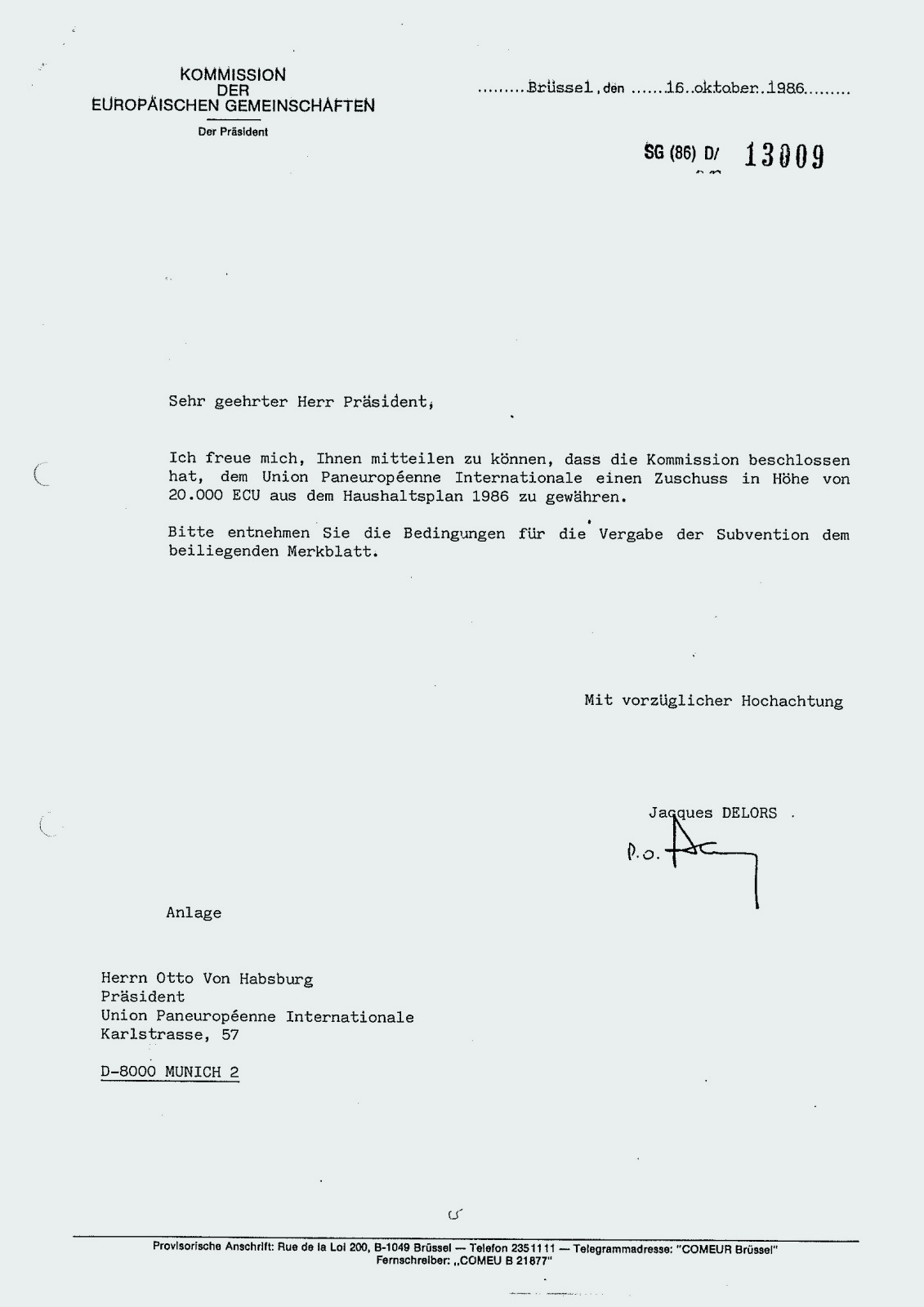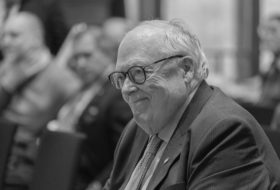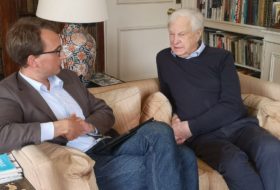Although the former President of the European Commission and Otto von Habsburg were political rivals, they held each other in mutual esteem and agreed on many issues. An important basis for their respect and appreciation for each other was that they both saw and experienced their commitment to public life as devout Christians.
The two politicians knew each other well. Forty-five years ago, in 1979, they were elected together to the European Parliament for the first time. Delors, who was 13 years younger than Otto, took seat 171 in the Strasbourg Parliament for the French Socialist Party (PS), while the former heir to the throne became a member of the Bavarian Christian Social Union (CSU) in the European People’s Party. For two years, they were members of opposing factions, but they spoke frequently, as Otto von Habsburg was also in contact with representatives of other political parties. And throughout his 20-year career in the European Parliament, he always paid particular attention to his French colleagues.
Jacques Delors joined the political formation then led by François Mitterrand in 1974. After the French Socialist Party (PS) came to power in 1981, he was appointed Minister of Economy and Finance. During this period, Otto von Habsburg was critical of Delors and the work of the Paris government. He noted ironically in his articles that the French finance minister’s biggest problem was that Germans worked too hard and did not regard socialism as the key to their future.[1] Delors was elected President of the European Commission in 1984. Otto von Habsburg commented on this event as well, saying that although the French politician was an experienced personality, he was not convinced that all the Commissioners were adequately prepared.[2] He also wrote a letter to Delors, at that time referring to his previous public activities as exemplary.[3]
They exchanged messages several times during the second term of the European Parliament. From 1986, Delors regularly provided financial support to the International Pan-European Movement, chaired by Otto von Habsburg. The former heir to the throne repeatedly used the following lines to express his gratitude: “I can assure you that, as it has always done, the Paneuropean Union will do its utmost to promote our common ideal of a united Europe.”[4] Otto von Habsburg asked the President of the European Commission to personally assist him on a number of issues, for example, he urged him to provide humanitarian aid to Romania.[5] Delors responded directly to these requests, sometimes in French and sometimes in German, and always tried to comply with them.
In 1989, when the French politician was re-appointed to the European Commission, the former heir to the throne, criticising some of the petty manoeuvring that went on in relation to appointments, remarked that “given the present bad system, it is surprising that the European Community still has a relatively good Commission.”[6]However, Otto von Habsburg expressed his slight disappointment with the French politician in 1989, believing that he was trying to promote a trade treaty with the Soviet Union by bypassing the European Parliament. He therefore initially supported the idea of the EPP submitting a resolution of non-confidence towards the Delors-led Commission, but in February 1990 he called the measure a “demagogic manoeuvre” and did not vote for it.[7] Indeed, Otto explicitly appreciated Jacques Delors’ understanding of Central and Eastern Europe, which was being liberated from Soviet occupation. In a speech to the European Parliament on 12 September 1990, he thanked the President of the Commission on behalf of his political party for drawing attention to the economic difficulties caused by the Gulf Crisis, which had affected not only the countries of the Middle East but also those of the former Eastern bloc. “I would like to say thank you to President Delors. In particular, I would like to extend my personal gratitude to him for drawing Parliament’s attention to the fact that the crisis is having a major impact on the countries of Central and Eastern Europe, something that has been somewhat forgotten in recent times.”[8] Otto von Habsburg, who was a member of the European Parliament’s Committee on Foreign Affairs and Security Affairs from 1989 to 1994 and chairman of the delegation in contact with Hungary, was deeply concerned about the region and paid attention to all statements relating to it.
In the early 1990s, though, the former Crown Prince criticised Delors’ policies. Otto von Habsburg complained that the President of the European Commission had made it difficult for Austria, and later the other countries of the region, to make progress in the enlargement process, and sometimes even obstructed it.[9] He agreed that reforms were important for the more efficient functioning of the European Community – hence his support for the Single European Act initiated by Delors and later the Maastricht Treaty – but he certainly did not want these processes to hinder the enlargement process.
Overall, despite the fact that their positions in communication, their political interests and their party affiliations sometimes put them at odds, the two politicians were fundamentally much closer than one might think at first sight. Jacques Delors and Otto von Habsburg shared similar views on most of the far-reaching European issues. This is confirmed not only by letters found in our Foundation’s archives, but also by the French politician’s words at the funeral service for Otto.
Jacques Delors was buried in Fontaine-la-Gaillarde, Burgundy, on 6 January 2024. (This event received much less coverage than the ceremony held the day before in the courtyard of the Invalides in Paris.) The Archbishop of Dijon, Antoine Hérouard, who conducted the service, said at the funeral mass: “In his many commitments and functions, Jacques Delors sought to live out a concrete form of attention to the most vulnerable, to the people most in need, a dimension of solidarity.”[10] The Archbishop quoted a speech given by the former President of the European Commission in Bruges on 17 October 1989,[11] where Delors himself invoked the words of Robert Schuman: “We will not succeed in Europe on the basis of legal or economic expertise alone […] if we fail to give Europe soul and direction in the next 10 years, we will lose our cause.”
No doubt that Otto von Habsburg believed so too.
Gergely Fejérdy
[1] Der Franc auf Talfahrt. Vorarlberger Nachrichten, May 7, 1983
[2] Gegenschlag der Bürokraten. Vorarlberger Nachrichten, October 13, 1984
[3] Otto von Habsburg Foundation, Otto von Habsburg Collection, HOAL, I-2-b, Jacques Delors, Pöcking, December 21, 1984
[4] HOAL, I-2-b, Jacques Delors, Pöcking, January 22, 1988
[5] HOAL, I-2-b, Jacques Delors, Pöcking, December 18, 1987
[6] Das europäische Jahr. Vorarlberger Nachrichten, January 7–8 1989
[7] Demmerle, Eva – Baier, Stephan: Habsburg Ottó élete. Budapest, Európa, 2003, 479.
[8] Otto von Habsburg im Europäischen Parlament 1979–1997. III. [München], [Hanns Seidel Stiftung], [1997], Nr. 3–393/130. (A collection compiled for Otto von Habsburg’s 85th birthday, which has not been released to the book trade.)
[9] Die Stunde Österreichs. Vorarlberger Nachrichten, 1990. május 12–13., illetve: Europäische Wiedervereinigung. Vorarlberger Nachrichten, March 16–17, 1991
[10] https://www.diocese-dijon.com/wp-content/uploads/sites/34/2024/01/obseques-de-jacques-delors.pdf (Downloaded 11/01/2024)
[11] https://www.cvce.eu/content/publication/2002/12/19/5bbb1452-92c7-474b-a7cf-a2d281898295/publishable_fr.pdf (Downloaded 11/01/2024)



